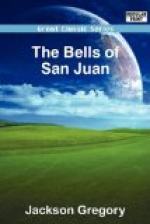“There was a killing this afternoon,” he admitted quietly. “No doubt you know of it and have been shocked by it, and perhaps on account of it have a little misjudged San Juan. We are not all cutthroats here, by any manner of means; I think I might almost say that the rough element is in the minority. We are in a state of transition, like all other frontier settlements. The railroad, though it doesn’t come closer than the little tank station where you took the stage this morning, has touched our lives out here. A railroad brings civilizing influences; but the first thing it does is to induct a surging tide of forces contending against law and order. Pioneers,” and he smiled his slow, grave, tolerant smile, “are as often as not tumultuous-blooded and self-sufficient, and prone to kick over the established traces. We’ve got that class to deal with . . . and that boy, Rod Norton, with his job cut out for him, is getting results. He’s the biggest man right now, not only in the country, but in this end of the state.”
Continuing he told her something of the sheriff. Young Norton, having returned from college some three years before to live the only life possible to one of his blood, had become manager of his father’s ranch in and beyond the San Juan mountains. At the time Billy Norton was the county sheriff and had his hands full. Rumor said that he had promised himself to “get” a certain man; Engle admitted that that man was Jim Galloway of the Casa Blanca. But either Galloway or a tool of Galloway’s or some other man had “gotten” Billy Norton, shooting him down in his own cabin and from the back, putting a shotgun charge of buckshot into his brain.
It had occurred shortly after Roderick Norton’s return, shortly before the expiration of Billy Norton’s term of office. Rod Norton, putting another man in his place on the ranch, had buried his father and then had asked of the county his election to the place made empty by his father’s death. Though he was young, men believed in him. The election returns gave him his place by a crushing majority.
“And he has done good work,” concluded Engle thoughtfully. “Because of what he has done, because he does not make an arrest until he has his evidence and then drives hard to a certain conviction, he has come to be called Dead-sure Norton and to be respected everywhere, and feared more than a little. Until now it has become virtually a two-man fight. Rod Norton against Jim Galloway. . . .”
“John,” interposed Mrs. Engle, “aren’t you giving Virginia rather a sombre side of things?”
“Maybe I am,” he agreed. “But this killing of the Las Palmas man in broad daylight has come pretty close to filling my mind. Who’s going to be next?” His eyes went swiftly toward the patio, taking stock of the two figures there. Then he shrugged, went to the table for a cigar and returned smiling to inform Virginia of life on the desert and in the valleys beyond the mountains, of scattering attempts at reclamation and irrigation, of how one made towns of sun-dried mud, of where the adobe soil itself was found, drifted over with sand in the shade of the cottonwoods.




